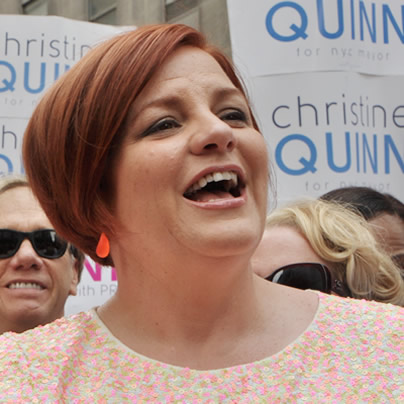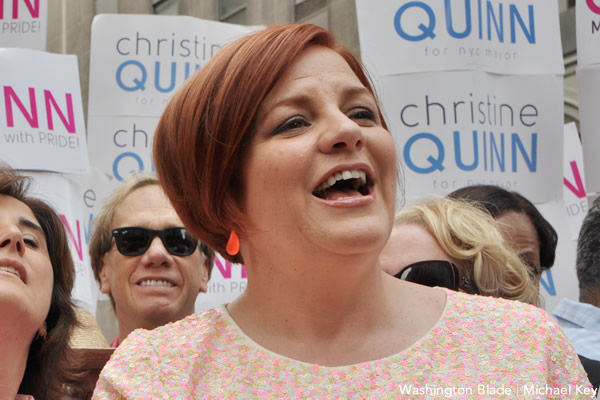News
Quinn losing ground in NYC mayor’s race: polls
De Blasio leads by 15 percent in new Quinnipiac University survey

Two new polls suggest New York City Council Speaker Christine Quinn’s lead over her Democratic challengers in the mayoral campaign has evaporated less than two weeks before the Sept. 10 primary.
A Quinnipiac University poll conducted between Aug 22-27 found New York City Public Advocate Bill de Blasio leads Quinn by a 36-21 percent margin. Twenty percent of likely Democratic primary voters backed former New York City Comptroller William Thompson, Jr., while former Congressman Anthony Weiner received 8 percent.
Another Quinnipiac University poll released on July 29 showed Quinn ahead of de Blasio by a 27-21 percent margin. Thompson came in third with 20 percent, while 16 percent of respondents backed Weiner.
An amNewYork-News 12 poll that Pen Schoen Berland conducted between Aug. 22-27 found 29 percent of likely Democratic voters support de Blasio, compared to 24 percent who back Thompson. Quinn came in a distant third with 17 percent.
Quinn needs at least 40 percent of the vote in the Sept. 10 primary to avoid a run-off.
“The polling in this race has been topsy-turvy for months,” Quinn campaign spokesperson Mike Morey told the Washington Blade. “We expect a tight race and we expect that on primary night Christine Quinn will be in a runoff, because New Yorkers want an effective progressive who can actually get things done.”
Quinnipiac University and amNewYork-News 12 released their polls four days after the New York Times endorsed Quinn, who would become the city’s first female and first openly LGBT mayor if voters elect her to succeed Mayor Michael Bloomberg in November. The Gay and Lesbian Victory Fund; the Stonewall Democratic Club of New York City; the New York Daily News; Empire State Pride Agenda and Edith Windsor, the Manhattan widow who successfully challenged the Defense of Marriage Act before the U.S. Supreme Court, have also endorsed Quinn.
De Blasio and Quinn have clashed over the New York Police Department’s controversial stop-and-frisk policy a federal judge last month found unconstitutional and other issues on the campaign trail and during a number of recent debates. Quinn continues to face criticism over her decision to support the extension of term-limits in 2008 that allowed Bloomberg, herself and other city officials to seek a third term in office.
Quinn in 2008 also acknowledged a City Council slush fund had since 2001 appropriated more than $17 million to community organizations that did not exist.
Brooklyn, N.Y., attorney Garfield Heslop in June asked the New York City Campaign Finance Board to investigate Quinn over the more than $20,000 in campaign contributions she received from donors in Houston, San Diego and Chicago after she attended Victory Fund events in the three cities in 2011 and 2012.
Pauline Park, a transgender activist in Queens who frequently criticized Quinn, told the Blade she feels the latest Quinnipiac University poll shows “the more the voters see of her the less they like.”
“Voters just aren’t buying Quinn’s phony baloney about being the one who’s delivered for New Yorkers,” Park said. “This survey also shows that 65 percent of Democratic primary voters want real change and a clean break with the plutocratic policies of the billionaire Bloomberg. And that is damaging Quinn, who as Council speaker has acted as a de facto deputy mayor in the Bloomberg administration.”
The Victory Fund did not respond to the Blade’s request for comment.
Paul Schindler, editor of Gay City News, which endorsed Quinn last month, noted to the Blade the polls have “bounced around a lot this year.” He said de Blasio’s numbers have only been good for the last few weeks, and he has come under more scrutiny as the current frontrunner ahead of the Sept. 10 primary.
“Clearly, de Blasio has made big strides,” Schindler told the Blade, referring to contributing factors that include Weiner’s growing unpopularity among voters and de Blasio’s position against the closure of St. Vincent’s Catholic Medical Center in lower Manhattan and other city hospitals. “He, Quinn and Thompson all remain in the mix. I’d be surprised if there is not a runoff.”
Spain
Spanish women detail abuses suffered in Franco-era institutions
Barcelona-based photographer Luca Gaetano Pira created ‘Las Descarriadas’ exhibit

A Barcelona-based photographer, audiovisual artist, and activist has created an exhibit that profiles Spanish women who suffered abuse in institutions that Gen. Francisco Franco’s dictatorship established.
Luca Gaetano Pira, who is originally from Italy, spoke with women who the regime, which governed Spain from 1936-1975, sent to Women’s Protection Board institutions.
The regime in 1941 created the board the country’s Justice Ministry oversaw.
Franco named his wife, Carmen Polo, as the board’s honorary president. Then-Prime Minister Felipe González fully dissolved the board in 1985, a decade after Franco’s death.
Gaetano’s exhibit is called “Las Descarriadas” or “The Misguided Women” in English.
“These are women who were detained between 1941 and 1985 for reasons that are unthinkable today: being lesbian, poor, pregnant out of wedlock, rebellious, politically active … or simply considered ‘morally suspect,'” Gaetano noted to the Washington Blade.
Groups affiliated with the Spanish Catholic Church ran these institutions. Gaetano pointed out they were “presented as social assistance centers.”
“In reality, they were spaces of punishment and forced reeducation, where isolation, unpaid work, and psychological violence were the norm,” he said. “Many of the survivors are still alive. Their testimonies are powerful, urgent, and of extraordinary current relevance.”
The regime sent more than 40,000 women to Women’s Protection Board institutions.
“Despite its seemingly benevolent name, it was in fact one of the most powerful instruments of moral and social control over women during and after the dictatorship,” notes the exhibit. “Under the guise of care and re-education, this institution functioned as a repressive apparatus that punished women who deviated from the ideal feminine model imposed by Franco’s regime: submissive, obedient, married, and dedicated to motherhood within the Catholic family structure.”
The Spanish Catholic Church last month issued a public apology, but Gaetano described it as “very soft” and noted “the women did not accept it.” Gaetano also compared the Women’s Protection Board institutions to Ireland’s Magdalene Laundries.
The Associated Press notes tens of thousands of “fallen” women were sent to the laundries that Catholic nuns operated in Ireland from the 18th century until the mid-1990s. Then-Irish Prime Minister Edna Kenny in 2013 issued a formal apology for the abuses that women suffered in the laundries and announced the government would compensate them.
The Spanish government has yet to offer compensation to the women abused in Women’s Protection Board institutions.
“My work focuses on recovering the historical memory of marginalized communities, particularly through the portrayal of survivors of institutional violence and the use of archival materials,” Gaetano told the Blade, noting he has also sought to highlight the repression that LGBTQ people suffered during dictatorships in Portugal and Latin America.
Gaetano’s exhibit can be found here:
District of Columbia
Gay GOP group hosts Ernst, 3 House members — all of whom oppose Equality Act
Log Cabin, congressional guest speakers mum on June 25 event

U.S. Sen. Joni Ernst (R-Iowa) and three women Republican members of the U.S. House appeared as guest speakers at the June 25 meeting of Log Cabin Republicans of D.C., the local chapter of the national LGBTQ Republican group with that same name.
The U.S. House members who joined Ernst as guest speakers at the Log Cabin meeting were Celeste Maloy (R-Utah), Kat Cammack (R-Fla.), and Julia Letlow (R-La.).
Neither D.C. Log Cabin Republicans President Andrew Minik nor spokespersons for Ernst or the three congresswomen immediately responded to a request by the Washington Blade for comment on the GOP lawmakers’ appearance at an LGBTQ GOP group’s meeting.
“Please join us for an inspiring evening as we celebrate and recognize the bold leadership and accomplishments of Republican women in Congress,” a D.C Log Cabin announcement sent to its members states.
“This month’s meeting will highlight the efforts of the Republican Women’s Caucus and explore key issues such as the Protection of Women and Girls In Sports Act and the broader fight to preserve women’s spaces in society,” the message says.
It was referring to legislation pending in Congress calling for banning transgender women from participating in women’s sports events.
According to media reports, Ernst and the three congresswomen have expressed opposition to the Equality Act, the longstanding bill pending in Congress calling for prohibiting discrimination based on sexual orientation and gender identity in the areas of employment, housing, and public accommodations.
The Log Cabin announcement says the meeting was scheduled to take place at the Royal Sands Social Club, which is a restaurant and bar at 26 N St., S.E. in the city’s Navy Yard area.
D.C. Log Cabin member Stuart West, who attended the meeting, confirmed that Ernst and the three congresswomen showed up and spoke at the event.
“It was a good turnout,” he said. “I would definitely say probably 30 or 40 people attended.” West added, “Four women came to talk to a group of mostly gay men. That’s something you don’t see very often.”
District of Columbia
D.C. police seek public’s help in July 5 murder of trans woman
Relative disputes initial decision not to list case as hate crime

D.C. police are seeking help from the public in their investigation into the murder of a transgender woman who they say was shot to death at about 12:30 a.m. on Saturday, July 5, on the 2000 block of Benning Road, N.E.
But the police announcement of the fatal shooting and a police report obtained by the Washington Blade do not identify the victim, 28-year-old Daquane ‘Dream’ Johnson of Northeast D.C., as transgender. And the police report says the shooting is not currently listed as a suspected hate crime.
It was local transgender activists and one of Johnson’s family members, her aunt, who confirmed she was transgender and said information they obtained indicates the killing could have been a hate crime.
“On Saturday, July 5, at approximately 12:51 a.m., Sixth District officers were flagged down in the 2000 block of Benning Road, Northeast, for an unconscious female,” a July 5 D.C. police statement says. “Upon arrival, officers located an adult female victim suffering from gunshot wounds,” it says.
“D.C. Fire and EMS responded to the scene and transported the victim to a local hospital where after all lifesaving efforts failed and the victim was pronounced dead,” the statement says.
A separate police flyer with a photo of Johnson announces an award of $25,000 was being offered for information leading to the arrest and conviction of the person or persons responsible for the murder.
The flyer identifies D.C. police Homicide Detective Natasha Kennedy as being the lead investigator in the case and says anyone with information about the case should contact her at 202-380-6198.
Longtime D.C. transgender rights advocate Earline Budd told the Blade that one of the police investigators contacted her about the case and that she also spoke to Detective Kennedy. Budd said police confirmed to her that Johnson was a transgender woman.

One of Johnson’s family members, Vanna Terrell, who identified herself as Johnson’s aunt, told the Blade that Johnson used the first name of Dream and had planned to legally adopt that name instead of Daquane but had not gotten around to doing so.
Terrell said she and other family members learned more about the incident when one of two teenage high school students who knew Johnson’s brother contacted a friend and told the friend that they recognized Johnson as they witnessed the shooting. Terrell said the friend then called her to tell her what the friend learned from the two witnesses.
According to Terrell, the witnesses reportedly saw three men approach Johnson as Johnson walked along Benning Road and one of them called Johnson a derogatory name, leading Terrell to believe the men recognized Johnson as a transgender woman.
Terrell said one of the witnesses told the friend, who spoke to Terrell, that the man who shot Johnson kept shooting her until all of the bullets were fired. Budd, who said she spoke to Terrell, who also told her what the witnesses reported, said she believed the multiple shots fired by the shooter was an “overkill” that appears to have been a hate crime. Terrell said she too believes the murder was a hate crime.
In response to an inquiry from the Blade, Officer Ebony Major, a D.C. police spokesperson, stated in an email, “At this point there is nothing in the investigation that indicates the offense was motivated by hate or bias.”
Terrell said a memorial gathering to honor Johnson’s life was scheduled to be held Saturday, July 12, at River Terrace Park, which is located at 500 36th St., N.E. not far from where the shooting occurred.

-

 Federal Government1 day ago
Federal Government1 day agoTreasury Department has a gay secretary but LGBTQ staff are under siege
-

 Virginia2 days ago
Virginia2 days agoDefying trends, new LGBTQ center opens in rural Winchester, Va.
-

 Opinions3 days ago
Opinions3 days agoUSAID’s demise: America’s global betrayal of trust with LGBTQ people
-

 Travel4 days ago
Travel4 days agoManchester is vibrant tapestry of culture, history, and Pride











